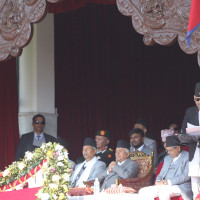- Monday, 15 December 2025
Breaking Stereotypes About Banking Careers
When the news of starting a job at a private bank was shared, most friends predicted that personal life would take a downturn, ongoing assignments would come to a halt, and all creativity would be lost due to the rigid, routine nature of banking operations. These concerns stem from widespread perceptions shared by both former and current bankers about the private banking sector. While banking is considered a rewarding career in Nepal, it is also infamously known for its high-pressure environment and the challenges of maintaining a work-life balance.
For a freshly graduated MBA, banking is often seen as the epitome of a good professional life. Master's graduates are typically recruited at the officer level and entrusted with a wide range of responsibilities. However, the general sentiment is that once entering the banking world, personal life takes a backseat, and the bank’s progress becomes the top priority. On one hand, it is fulfilling to contribute to an institution that plays a crucial role in the economy. On the other hand, the Gen Z mindset, which values freedom and flexibility, often clashes with the structured nature of banking jobs.
Commitments
With all these thoughts spinning in mind, the decision was made to accept the offer and begin a banking journey. At the time, several significant commitments were lined up: being a second-semester MPhil scholar working towards a PhD, a final-year law student, an MBA lecturer teaching four classes a day, an applicant to Harvard University, a researcher contributing to peer-reviewed journals, and, most importantly, an avid traveler. Many people doubted whether all of this could be managed alongside a private banking job, especially being stationed outside Kathmandu Valley and commuting 80 kilometers daily between Kathmandu and Kavre. It seemed impossible, but not from this perspective.
There has always been an innate drive to achieve milestones, year after year. While this might sound ambitious and progressive, it can also be risky if those goals are not met. During most interviews, the label of being “too ambitious” was often attached, raising concerns about sustainability. However, employees are contributors. Skills and time are dedicated to the organisation’s growth, but personal development is equally critical, not just for individuals but also for the organisation’s overall progress. The banking career began with oversight of operations and credit departments while juggling five significant commitments. Many assumed some or all of them would eventually be given up, but the determination remained to prove that a banking career does not have to hinder personal growth as long as dedication and focus are maintained.
Within the first year of employment, all of these activities, including the journey to Harvard University, were successfully completed. The realisation came that the drive to succeed ultimately lies within oneself. Support from seniors and colleagues is valuable, but a strong sense of determination and a commitment to personal goals are what truly make the impossible possible. There are also widespread beliefs that employee rights are often overlooked and their commitments breached. Articles 18, 33, and 34 of the Constitution of Nepal, 2072, guarantee inclusion, employment, and labour rights, respectively, extending to banking professionals. Legally, the Labour Act, 2074 ensures the rights of employees regarding working hours, break periods, leaves, and other facilities. Likewise, the Bonus Act, 2030 should be referred to as necessary. The Social Security Act, 2075 also provides social security benefits, including medical care, insurance, and retirement facilities.
Furthermore, some precedents and landmark decisions by the Supreme Court concern the rights of bankers in Nepal. Before employment, an appointment letter is issued, governed by the contract provisions under the Muluki Civil Code, 2074. From the employee's perspective, it is essential to fulfil duties and disciplinary obligations in a proper manner. Additionally, employees must adhere to the organisation’s code of conduct to ensure good performance. However, there have been several instances where employees were found to be unfaithful to their organisations and were consequently restricted from banking jobs. These actions were justified under various legal provisions, including the Banking and Financial Institutions Act, 2073, the Banking Offense and Punishment Act, 2064, the Muluki Criminal Code, 2074, the Asset (Money) Laundering Prevention Act, 2064, the Companies Act, 2063, as well as guidelines and circulars issued by Nepal Rastra Bank.
Personal growth
Considering the increasing prevalence of fraud in the digital space, the Electronics Transactions Act, 2063 offers some protection for consumers. Although this act is somewhat outdated, it still addresses problems prevalent in the online environment. However, it is instrumental to formulate a modern act that includes regulations related to cybercrimes such as phishing, ransomware attacks, unauthorized access, Distributed Denial of Service (DDoS) attacks, ATM skimming, identity theft, and more. Furthermore, there must be a clear policy for end-users of banking apps, as it has been observed that users in Nepal often share their credentials with friends and family, compromising the security of the application.
Although banking can be challenging to some extent, it also provides space for personal growth, professional development, and impactful contributions to the economy. The legal protections in place for employees, the continuous advancements in regulations to combat cybercrime, and the evolving role of bankers in a digital landscape all play a part in reshaping how careers in banking are viewed. It is a sector where ambition can come true with dedication and the right balance.
(The author is strategy officer at Global IME Bank)

















